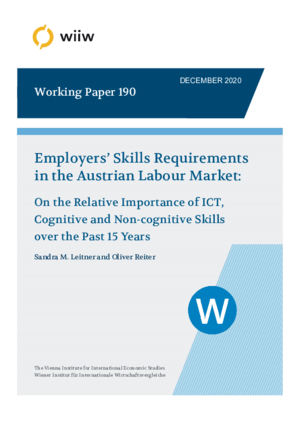Employers’ Skills Requirements in the Austrian Labour Market: On the Relative Importance of ICT, Cognitive and Non-cognitive Skills over the Past 15 Years
Sandra M. Leitner and Oliver Reiter
wiiw Working Paper No. 190, December 2020
37 pages including 3 Tables and 9 Figures
This paper analyses job advertisements to identify the particular skills, abilities and characteristics that are in demand on the Austrian labour market. It takes a novel approach and uses information extracted from over 1.5 million job advertisements over the past 15 years from Austria’s largest online job portal, karriere.at, to shed light on employers’ skills needs and the relative importance of, and demand for, different skill types over time. It develops a taxonomy which classifies observable skills into information and communications technology (ICT) skills (which are of increasing importance as a result of the ongoing digital revolution), cognitive skills, cognitively based skills and non-cognitive (soft) skills; but it also takes into account other factors that frequently appear in job advertisements, such as previous work experience, physical appearance, and the willingness to travel, work overtime, weekends or shifts, among others. It shows that Austrian employers are quite demanding: cognitive skills, previous work experience and ICT skills were the three most frequent requirements, appearing in (almost) every second job advertisement in 2019. Over the years, these categories have also become increasingly important to employers. Among cognitively based skills, language skills were the most important, also appearing in every second job advertisement. The ability to work as part of a team, communication skills, independence, flexibility and accuracy were the top five non-cognitive (soft) skills demanded by employers.
Keywords: Job advertisements, online job portal, skills requirements, ICT skills, cognitive skills, non-cognitive skills
JEL classification: J23, J24, J63
Countries covered: Austria
Research Areas: Labour, Migration and Income Distribution
